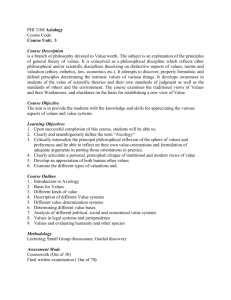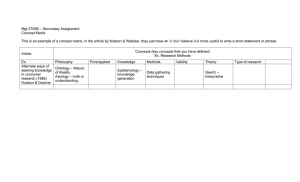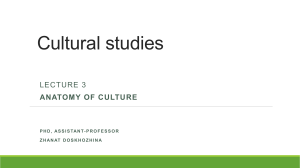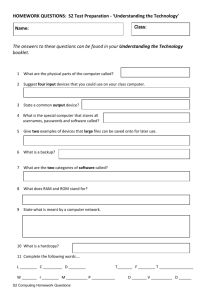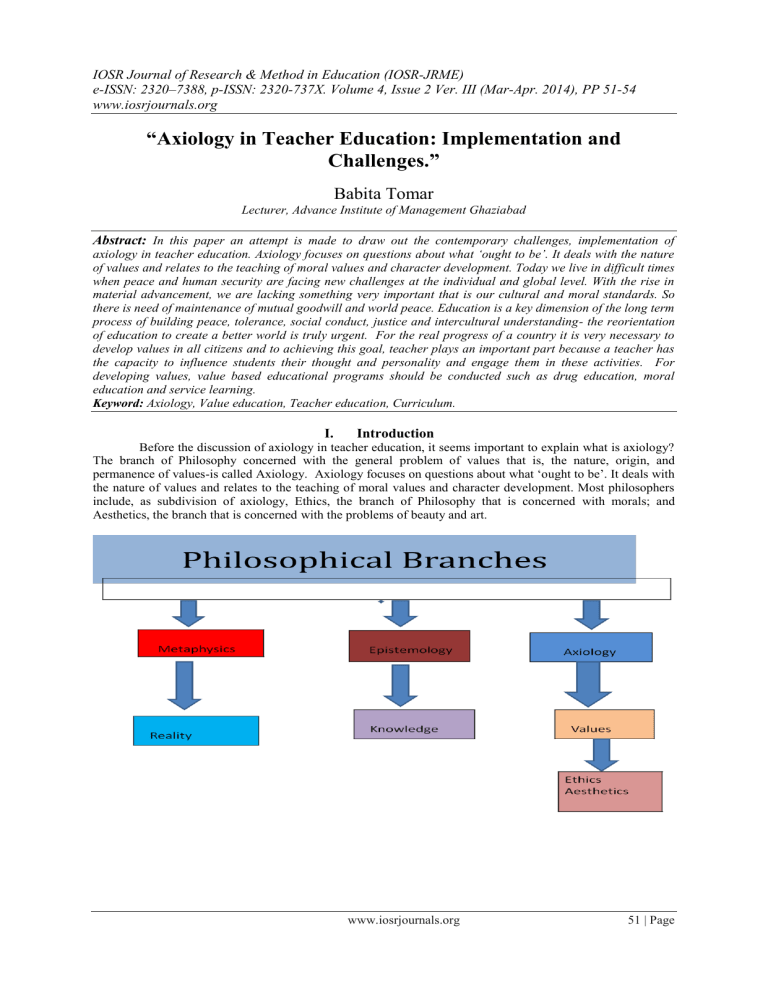
IOSR Journal of Research & Method in Education (IOSR-JRME) e-ISSN: 2320–7388, p-ISSN: 2320-737X. Volume 4, Issue 2 Ver. III (Mar-Apr. 2014), PP 51-54 www.iosrjournals.org “Axiology in Teacher Education: Implementation and Challenges.” Babita Tomar Lecturer, Advance Institute of Management Ghaziabad Abstract: In this paper an attempt is made to draw out the contemporary challenges, implementation of axiology in teacher education. Axiology focuses on questions about what „ought to be‟. It deals with the nature of values and relates to the teaching of moral values and character development. Today we live in difficult times when peace and human security are facing new challenges at the individual and global level. With the rise in material advancement, we are lacking something very important that is our cultural and moral standards. So there is need of maintenance of mutual goodwill and world peace. Education is a key dimension of the long term process of building peace, tolerance, social conduct, justice and intercultural understanding- the reorientation of education to create a better world is truly urgent. For the real progress of a country it is very necessary to develop values in all citizens and to achieving this goal, teacher plays an important part because a teacher has the capacity to influence students their thought and personality and engage them in these activities. For developing values, value based educational programs should be conducted such as drug education, moral education and service learning. Keyword: Axiology, Value education, Teacher education, Curriculum. I. Introduction Before the discussion of axiology in teacher education, it seems important to explain what is axiology? The branch of Philosophy concerned with the general problem of values that is, the nature, origin, and permanence of values-is called Axiology. Axiology focuses on questions about what ‘ought to be’. It deals with the nature of values and relates to the teaching of moral values and character development. Most philosophers include, as subdivision of axiology, Ethics, the branch of Philosophy that is concerned with morals; and Aesthetics, the branch that is concerned with the problems of beauty and art. www.iosrjournals.org 51 | Page “Axiology in Teacher Education: Implementation and Challenges.” Values guide our decision as to what is good, true and right. Thus they depend as much on your feelings as on our thoughts. These values include the simple difference between right and wrong, a belief in God, the importance of hard work, self respect. Value based education is a tool which not only provides us a profession but also a purpose in life. The purpose of our life is undoubtedly to know oneself and be over selves. Value based education is a key dimension of building peace, tolerance, social conduct, justice and intercultural understanding. For the real progress of a country, it is very necessary to develop values in all citizens and to achieving this goal, teacher plays an important part. Teachers are key for knowing or understanding a nation. In the other words, they are the builders of a nation. So to make the significant development in a nation or society we have to look towards teachers. Thus we can hope to achieve sound development of personality of a child by the teacher. It is a universal truth that personality of a teacher has a positive effect. A teacher can play an important role in promoting this discussion because a teacher has the capacity to influence students with their thoughts and personality and engage them in these activities. The teacher must never impose ethical codes or standards of behavior: these should arise out from social situation and the pupil’s evaluating of his own behavior. Raise a child to understand how to relate well with other people and righteousness open doors to many opportunities. II. Challenges: The main problem of present time is ‘deterioration of values in human beings’ Corruption is increasing day by day. Material advancement made us greedy and selfish. Nobody is careful about maintaining the values. When we go through newspapers, T.V and other agencies, we come to know about many crime activities, which are very much shocking for the human beings. Therefore the modern poet T.S.Eliot has called this world ‘A Waste Land’ where men are spiritually dead in the midst of unparallel material progress and miraculous scientific achievement. There are so many challenges, but some of these are mentioned here: Nuclear family system decreases the values because parents have not much time for their children. In joint family a great deal of care, love and wellbeing. The old received as much care and attention as the very young and the all children were shared by a sort of common wealth and a source of joy and happiness. Story telling have always been an effective way of presenting values, concept and ideas. Misdirected education system instead of developing a person as human being it is only directed towards superficial, surface level achievements. Education today is nothing but a profit making business, it will go on to become our source of bread and butter. It is designed purely for money making and not for man making and only promotes negative qualities like jealously hatred and rivalry instead of virtues like kindness, compassion and honesty. Shortage of well-trained dedicated teachers, value based curriculum, innovative teaching methods, materials and service learning approach. Today there is a rapid advancement in technology and science is taken place. With the rise in material advancement, we are lacking our cultural and moral standards. There is more greed, more selfishness, lack of sincerity and integrity. Politics oriented student’s unions. Media is one of the leading causes for value deterioration. Television, videogames, music lyrics that have violent connotations has a negative effect on a child’ psychology. Tit for tat attitude, demanding nature of children, self interest dominates public interest, no interest in religious practices, no respect for elders and teachers. Lack of refresher programs, scholarships for teachers, extra burden of work like election, polio drops, guiding duty, census survey etc and absence of sacrifice among teachers for their students. Urbanization has bad impact on the culture and rural life values, including socialization. III. Implementations: Today there is a rapid advancement in technology and science is taken place. With the rise in material advancement, we are lacking our cultural and moral standards. Everywhere, more greed, more selfishness, lack of sincerity and integrity has been spread. So it is necessary to sown the seed of peace, love, cooperation and moderation in the minds of men and women very early from their childhood through the education for peace. Some implications have been given here; are following: Involves all members of the school community (student, parents, teachers, community, and members). Values reflected across the whole school in : -The articulated school mission, purpose and values. - All school policies and guidelines. - The behavior of students, teachers, school staff and parents. - The curriculum and learning materials in all subjects’ areas. www.iosrjournals.org 52 | Page “Axiology in Teacher Education: Implementation and Challenges.” - The teaching/learning process, methodology. - The whole school cultural and environment. Good education is a joint effort of the school and parents. Though the school can do a lot for the children it cannot do everything. The home is the first place where he/ she get his/her education. So parents should give much time for their children. Parents should monitor their wards watching of TV program and allow only those programs which are educative and morally conducive for the integral growth of their wards. Parents should cooperate with the school in enforcing regularity and discipline in the children. Education must give supreme priority to the development of the rational potential within each pupil. Educators must stress the importance of the development of both the intellect and will and to teach pupil how to think. Knowing how to think in order to make good decision will make it possible for students to cope with life’s problems and to steer themselves on to the course for good life. To carry out this objective, school must re organize pupil’s experiences in order to enhance their meaning, thereby enabling them to direct more fully and more competently the course of their own future experiences. Whereas the goal of education is the development of the rational potential of the pupil, education must include those subjects that assist in the intellectual development of the pupil because they contain the accumulated wisdom of civilized man, the humanity ought to be given dominance. Yogic activity should be including in curriculum. Education is life itself; therefore, the curriculum too must be life itself. It cannot be limited to the academic. A problem centered, pupil centered, experience centered curriculum featuring such approaches as shared activities, critical evaluation, pupil involvement in decision making, community service projects. Lessons should be taught as realistically as possible. The teacher must never impose ethical codes or standards of behavior: these should arise out from social situation and the pupil’s evaluating of his own behavior. The teacher ought to provide as many real experiences and opportunities to discuss virtuous acts and lives as possible. Pedagogies: o Work in group o Give equal opportunity to all the students and keep them alert. o Respect students. Use personalization and student's imagination. o Involve the students more and give them more opportunities. o Encourage student’s generated activities o Motivate them; expose them to variety of questions. o Active in constructing knowledge makes use of collaborative work to facilitate learning. o Encourage pupil participation. o Time and space for values. Focus on children’s social and emotional wellbeing in the classroom, a crossing the whole school and throughout of school services. o Focus on skill and competencies and commitment. o Promote independence o Support reflection and self evaluation. o Listen and act upon the voices of learners. o Closed attention should be paid to learner’s knowledge, skills, understanding and attitudes. o Tailoring pedagogies that are appropriate to children’s development. o Taking a more flexible, theme based approach, where appropriate. o Develop higher level critical thinking skills and core values. Creating institutional ethos in the institutions. The celebration of festivals and important days in Indian history takes place by enacting historical events. Understanding the attitudes, emotions feelings and motives of students is very important and plan activities accordingly. Have to create open, flexible, creative and orderly value based environment. The students will more closer to understand their own values. Conducted cultural programs, providing awareness and respect of traditional dance and music, formation of special assemblies. Inculcate self discipline, humanitarian principles through internal motivation. www.iosrjournals.org 53 | Page “Axiology in Teacher Education: Implementation and Challenges.” Developing student responsibility in local, national and global contexts. Building student resilience and social skills. Ensuring values are incorporated in school policies and teaching programs. Articulating the school’s mission/ethos. Develop core values by care and compassion, fair decision, freedom, work with honesty, collaborative learning opportunities Drug education, yoga meditation, Spiritual education, social skill programs. Service learning provides the opportunity for students to learn and develop through active participation to meet a specific community need. Students experience success in helping others and learn to view themselves differently. The children should be encouraged to cultivate habitual cleanliness in his/ her work and person. To help the students to know, to love and to serve God through their fellow men and to prepare them to serve humanity in a better way. Foster punctuality and regularity in attendance, school uniform, polite behavior inside and outside the school. Students should be strictly prohibited to bring objectionable/ obscene literature into the school; they are also not allowed to bring mobiles etc. Make the students realized that are responsible the good name of school, society. Country. The school should cater to needs of children irrespective of their caste and creed. Make the students realize their dignity as children of God. The school should encourage attitudes of social responsibility and concern for the social problems of human society. After above discussion we conclude that good education is a joint effort of the school, parents policymakers so every stakeholder of this process consider the value education as their accountability. Through these, cultured, socially concerned, thinking, self disciplined citizens, skilled workers, highly trained specialists are prepared who give their best for nation. References: [1]. [2]. [3]. [4]. [5]. [6]. [7]. [8]. [9]. [10]. [11]. [12]. Ahmad,A.(1999) Management of human values: An overview. Journal of Human Values. Anand, S.P. (1980). Teacher’s values and job satisfaction, Indian Education Review Barrow ,Robin (1979) The philosophy of schooling, somer set New Jersey: the Halsted press. Bharadwaj.Tilak Raj,(2001)Education of human values, Mittal publications New Delhi. Bhushan, A, and Ahuja, M. (1980). Value System and value preference of Indian youth belonging to different scio-metric levels”, journal of Institute of Education Research. Brameld ,Theodore ,(1971)Pattern of educational philosophy ,New York: Holt Rainhart and Winston. Bronowski, j. (1956) Science and human values, New York: Harper & Row, Publishers Harper torch book. Dagar, B.S. &Dhull, A case for Value- Oriented Education. University News. Gupta, B.M.(1997) Role of Induction Programme in Teaching Effectiveness. Journal of Indian Education. Jasta, Hari Ram (1990). Spiritual Values and Education, Published by Prabhat Parkashan, Delhi. Mishra, Kamalanke.r(2003).Value education,A suggested programme for teachers & parents, Journal of Value education Voulme 3, January2003. www.iosrjournals.org 54 | Page
